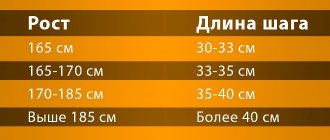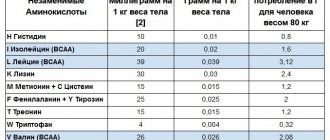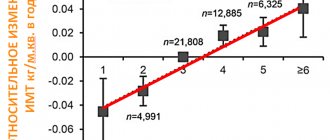To feel well and maintain vital functions, a person needs a source of energy. You can get it from various foods that contain useful substances - fats, proteins and carbohydrates. The indicators of these components affect the calorie content of food. To calculate how many calories a person needs per day, you need to know your activity level, that is, energy expenditure.
Basics of Dietetics
Dietetics is the science of proper nutrition. The essence of energy balance is as follows:
- The intake of food into the body must be equal to its consumption.
- Food must contain carbohydrates, proteins and fats in the prescribed proportions.
- It is imperative to have vitamins and microelements in your daily diet.
If a person does not receive enough natural active substances, he begins to develop various diseases (hypertension, obesity, diabetes and others), which leads to a decrease in average life expectancy.
Balanced diet
To know how many calories you can consume per day, you need to know your energy expenditure (metabolic rate). The general metabolism in a person depends on the main and additional ones.
Basic metabolism is the number of calories the body expends to perform all important functions. How many calories a person normally needs per day depends on the main metabolism and the following factors:
- floor;
- weight;
- height;
- body constitution;
- level of hormone production.
Accordingly, the calorie intake per day depends on the listed criteria. For example, in men, chemical processes in the body occur faster than in women. Young people spend more energy than older people. The average daily metabolism in the adult population is 25 kcal per kilogram of weight.
How much protein should a person consume per day to be healthy? Athletes and active young people should consume 1.5-2.5 grams of protein per 1 kg of body weight per day. A person weighing 80 kg can eat 200 grams of protein daily. People with moderate activity can consume up to 1.5 grams per 1 kg of body weight. If you have a sedentary lifestyle, then it is enough to eat up to 1 gram per 1 kg per day.
Weight gain rate
There is a difference between intentional weight gain and uncontrolled eating. In the first case, this process is systemic and is used both for visual effect and as an introductory step in the method of calorie counting. In these cases, muscle mass gain will occur much more slowly.
If there are sharp deviations from the caloric norm in the direction of increase, reserve fat will be deposited almost instantly.
However, with a gradual increase in the volume of the diet to your own norm in increments of 50 kcal weekly, weight gain will not be observed at all.
This is due to the fact that the body gradually adapts its work to the new diet. However, with a calorie deficit, a sharp transition to a new nutrition system will lead to extra pounds.
Don't miss the most popular article in the section: Fashionable bangs of the new season for medium, short, long hair. Photo.
Where do calories come from?
As mentioned above, food contains carbohydrates, fats, proteins, vitamins, microelements and water. The last three components do not provide energy to the body. The calorie content of food is expressed in the energy value necessary to maintain life in the human body.
The human body consumes food to perform a variety of functions, such as heat generation, respiration, blood transport through cells, for rest and work, and sports. If a person consumes more than he expends, then some of the calories are stored as fat, and the person gets fat.
What are calories
A calorie is the amount of energy that is expended to heat 1 g of water by 1ºC, respectively, 1000 such units will be 1 kcal. At home, it is impossible to determine the energy potential of products.
The number of calories that a person should consume and expend per day, as well as the calorie content of foods, are calculated by biophysicists in laboratory conditions, and tables are compiled from which the energy value of food is determined. Based on these data, nutritionists make recommendations on how a person should eat.
What happens when you don't have enough calories?
When calculating the daily norm, you need to take into account every little thing: putting butter in porridge or mayonnaise in a salad. An excess of calories, just like a deficiency, is fraught with consequences for the body. If there are few nutrients coming from food, the body begins to use energy from muscle tissue rather than from excess fat.
Lack of fats and carbohydrates in the diet can reduce basal metabolism. The body, maintaining a constant supply of sugar to the brain, uses up its own supply of glycogen, which is stored in the liver. Glycogen is gradually removed from muscle tissue, and as a result, a person begins to lose weight. If reserves are depleted, a person stops losing weight.
Fat tissue is not used to nourish the brain. During the period of weight loss, the body uses fat deposits as energy, but the decrease in these reserves is much less than the loss of muscle and bone tissue. If a person deprives himself of fatty foods during a diet, then weight loss occurs due to bone and muscle tissue. This is fraught with danger for the body, as it threatens exhaustion.
Useful tips and reviews
On the Internet you can see many approving reviews and before and after photos of girls who managed to lose weight by counting calories. The advantages of this method of losing weight include the following nuances:
- many positive opinions;
- proven effectiveness;
- without fasting and mono-diets;
- product availability;
- large selection of dishes;
- variety of recipes;
- healing of the body.
Many girls are afraid of this method of losing weight because of the need to constantly count calories. Fortunately, today you don’t need to constantly walk around with a table of the energy value of foods and look for the right food in the list. Everything is much simpler. Modern life hacks will help you lose weight:
- It is recommended to prepare dishes several days in advance. The products are weighed in advance and placed in containers, with stickers indicating the calorie content and meal time.
- Mobile apps allow you to keep a food diary and add up calories per meal. In seconds you can find out the energy value of any dish.
- It is recommended to purchase special scales for the kitchen. They can synchronize with a smartphone and easily determine the calorie content of dishes.
It is better to choose simple dishes, the errors in calculating calories will be minimal. This way you can lose weight with pleasure and benefit.
Formula for calculating daily value
How many kilocalories does a person need? The norm is determined based on the following data:
- basal metabolism is the expenditure on the vital functions of the body: breathing, digesting food, supplying organs with blood, and so on;
- daily expenditure on physical labor.
The Muffin Jeora formula will help you calculate the number of calories per day:
- OM for women = 6.26*(height in cm) + 10*(weight in kg) - 5*(age in years) - 161;
- OM in men = 6.26*(height in cm) + 10*(weight in kg) - 5*(age in years) + 5, where (OM) is general metabolism.
Using this formula, you can calculate how many calories a person should consume per day to lose weight. To gain weight, a person needs to increase this indicator by 20%, to reduce body weight - reduce it by the same amount.
Weight loss rate
Losing weight by 2-3% of your current weight per week is considered safe by nutritionists. With large mass losses, the body will begin to destroy itself and extract energy from these substances. The largest drop is observed at the beginning of the diet; subsequently, its loss slows down.
It is important to understand that supplementing nutrition with active physical activity can cause weight loss. This is due to the accumulation of fluid in the muscles, as well as their growth. In this case, you need to observe a visual decrease in volume.
Norm for women
Young women aged 18-30 spend an average of 2000 kcal. If a woman is actively involved in sports or works a lot, the daily norm increases.
The norm of kilocalories per day for a woman depends on the same parameters as for men:
- Sedentary lifestyle or no physical activity – 1300-1500 kcal per day.
- Low physical activity – 1500-1700 kcal.
- Moderate activity – 1800-2000 kcal.
- Heavy loads – 2000-2400 kcal.
These are approximate values. How many calories a woman needs to consume per day can be calculated using a formula that takes into account weight, height and index (physical activity value).
Harris-Benedict formula:
447.6 + 9.2 * weight in kg + 3.1 * height in cm – 4.3 * age.
The result obtained must be multiplied by the activity index.
For example: a 26-year-old girl, 163 cm tall and weighing 64 kg. Goes to the gym two to three times a week.
447.6 + 9.2 * 64 + 3.1 * 163 – 4.3 * 26 = 1430 kcal.
Let's multiply it by the activity index (1.375) and get the daily requirement of 1966 kcal.
Women over 50 need slightly fewer calories as their basal metabolism declines.
A woman during pregnancy and lactation needs more calories. But this does not mean that pregnant women should eat for two; in case of edema or excessive weight gain, they may prescribe a diet. With a normal initial weight before pregnancy, pregnant women should consume from 2500 to 3500 kcal per day.
How to count calories for weight loss
To lose 1 kg, you need to burn over 7500 kcal. However, losing weight only by eliminating harmful and fatty foods is impractical. It is important to increase physical activity to speed up your metabolism. There are other important recommendations from experts that must be followed during a low-calorie diet:
1 If you are slightly overweight and regularly exercise, you need to remove 5-10% of kcal from the daily requirement. This option is acceptable for smoothly losing extra pounds.2
If you have 5-6 extra kg, and there is no opportunity to exercise, you should subtract about 20% of the daily kcal requirement.
3
People with early stages of obesity need to cut their daily kcal intake by 40%.
If on some day you had to exceed your calorie intake, it is worth doing a fast during the week and reducing the amount of food consumed.
Norm for men
A man's diet should be high enough in calories to maintain all functions in the body. The daily calorie intake per day for men with moderate activity is 2500-2800 calories. If there is no physical activity, energy is consumed in different ways.
How to calculate how many calories a man needs per day? You can use the following formula: OM for men = 6.25*(height in cm) + 10*(weight in kg) - 5*(age in years) + 5.
There is another formula for calculation: (13.4 * weight in kg + 88.37 + 4.8 * height in cm – 5.7 * age) * activity index.
The daily calorie intake per day for a man depends on his activity. The result must be multiplied by the index, which corresponds to the level of physical activity:
- sedentary work or no activity - 1.2;
- light physical labor – 1.4;
- moderate physical activity – 1.55;
- heavy physical work – 1.7;
- hard physical labor + active sports training – 1.9.
Here is an example of calculating the amount of kcal per day for men:
A man with a height of 181 cm weighs 88 kg, moderate activity. Substituting the values into the formula, it is easy to calculate how many calories a man needs per day: 6.25*(height in cm) + 10*(weight in kg) - 5*(age in years) + 5 = 1781 kcal.
When asked how many calories a man needs to consume per day if he wants to lose weight, the answer is that he must reduce his diet by 20%.
How do they calculate how many calories a person needs per day?
Today, two formulas are most often used to count calories:
- Harris-Benedict formula;
- and the Mifflin-San Geor formula.
The first one was launched in 1919. However, it is no longer considered 100% correct. The Mifflin-San Jeor formula, although it appeared recently, is currently distinguished by the greatest accuracy.
Both formulas contain a physical load coefficient:
- 1.2 - no physical activity;
- 1.375 – sports 3 times a week;
- 1.4625 – sports 5 times a week;
- 1,550 – intensive training 5 times a week;
- 1.6375 – daily sports activities;
- 1.725 – intensive sports daily or twice a day;
- 1.9 – physical labor simultaneously with daily sports.
ARTICLES ON THE TOPIC:
- Online calculator for calculating daily caloric intake
- Calorie norm per day for a woman - how to calculate
- Calculate calories for weight loss - online calculator
Let's use these formulas to calculate how many calories a person needs per day.
Weight correction
Systematic consumption of calories less than the daily norm promotes weight loss and weight correction, especially if you combine a diet with sports activities. The daily calorie intake for a woman when losing weight is 80% of the usual per day.
The same indicator is used when losing weight, if you need to calculate the daily calorie intake for men. For harmless weight loss, nutritionists advise reducing the calorie content of food gradually. If the norm of kilocalories per day is 2000, then using 1600 kcal per day, you can achieve gradual weight loss.
The norm of kilocalories per day for men to maintain weight is 1800 kcal. It is not recommended to reduce this value below to avoid health problems. The daily calorie intake for weight loss depends on the individual intake of a particular person.
The required nutrients must be contained in the exact ratio:
- proteins – 30%;
- carbohydrates – 50%;
- fats – 20%.
With classic weight loss, all these components should be present in the diet of any person. The lack of one of these components will negate all efforts. You need to plan your daily diet taking into account physical activity, and then your body will delight you with beauty and grace for a long time!
Consequences of insufficient and excess calorie intake
At first, insufficient or excessive calorie intake may not be noticeable.
However, this lifestyle systematically harms the body, which is why the accumulated habit can lead to the following negative consequences:
- decreased immunity;
- eating disorders, such as compulsive overeating;
- disturbances in the gastrointestinal tract;
- oncology;
- disorders in mental and physical development.
In addition to the lack of calories in the diet, their excess gives rise to a lot of problems leading to obesity and accompanying diseases:
- diabetes;
- diseases of the cardiovascular system;
- atherosclerosis;
- disorders in the musculoskeletal system.
It should be understood that the calorie rate for one person may be too high or low for another. Only the volume of reserve fat can tell whether the diet is correct.
How to calculate your daily calorie intake for weight gain
To calculate the required number of calories there is a formula:
weight (kg)x30 = kcal.
For example, a guy weighs 74 kg, which means his daily caloric intake is 74x30 = 2200 kcal.
But, this figure indicates the approximate number of calories to maintain the body in an unchanged state. Since the goal is to gain weight, you need to add at least 500 calories on top to the calories received. Those. 2200+500=2700 kcal. It is also important to take into account your body type: mesomorph, ectomorph, endomorph. The first and second ones can safely add 1000 calories, but the last one is better off raising the bar to 500 kcal.
As your body weight increases, your caloric intake should also increase. More precisely, if initially a guy weighed 74 kg, and he needed 74x30=2200+500=2700 kcal per day, then when the weight rose to 80, he needed to recalculate again: 80x30=2400+500=2900 kcal.









